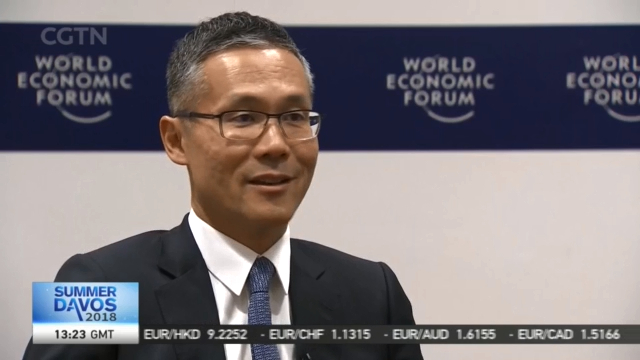
16:38, 21-Sep-2018
Summer Davos: Ngai discusses merits of AI
Updated
16:09, 24-Sep-2018
03:17

CGTN's Michael Wang is in Tianjin to report on the Summer Davos. During his stay at the three-day event, Michael sat down with Joe Ngai, the managing partner of Greater China Office of McKinsey Corporation, to hear what he had to say about the impact of artificial intelligence on the financial system.
1. JOE NGAI, MANAGING PARTNER GREATER CHINA OFFICE, MCKINSEY & CO. "It's early days around how AI and other fintech applications would improve the financial system. There is a lot of innovation around how do you assess credit, normally we get a piece of paper, we say what's your income, your work. These days people think in many different ways. First of all, your social media profile, many of your things you do with your phone, a lot around your behavioral patterns. All those things, when you put them into a data base, you have AI using lots of algorithms, you may come up with actually. This person is very goog risk. Under the normal traditional ways, I would never lend to this person. Another thing is around payments. In China we already take it for granted, everything paid with phones. That has a lot to do with how do people think about disbursement of money."
2. JOE NGAI, MANAGING PARTNER GREATER CHINA OFFICE, MCKINSEY & CO. "I don't think it actually brings extra risk, because people are using it as an extra tool. It's like I hire three more assistants that help me out. Is hiring one more assistant going to bring more risks? Or is that helpful for me because it's a third opinion. As long as I'm still around, the assistant only gives me inputs."
3. JOE NGAI, MANAGING PARTNER GREATER CHINA OFFICE, MCKINSEY & CO. "There are three segment of leaders in the world. One is those passionate true believers, they believe that if I don't get on to robotics and AI, and how those technologies are changing the world, we will no longer be able to be significant in the next era. I would say that's 10%. And there is a good 50% of people, that are skeptical but fast forward. The remaining 40%, because of the last 10 years of financial crisis, because of many regulations and fines by many regulators, because of many risk and internal things they need to take care of. They are not there yet in terms of this entire picture. To them it's like an experiment happening out there, but that's that world, and I have my current world, it's a different world."

SITEMAP
Copyright © 2018 CGTN. Beijing ICP prepared NO.16065310-3
Copyright © 2018 CGTN. Beijing ICP prepared NO.16065310-3